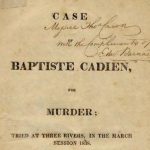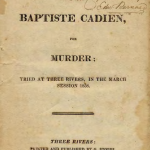1838
The Trial of Baptiste Cadien
In 1835, an unusual conflict occurred in the tiny Hudson’s Bay Company (HBC) trading post of Fort Norman (near present-day Tulita). HBC officials recorded in the post journal actions of men working for the company that “servants of that establishment [fell] upon a party of Indians of whom they killed 12 individuals three men, one woman, and eight children, places the establishment in a most alarming and dangerous situation.”
The episode is said to have taken place seven days from the fort where Baptiste Cadien, a Métis interpreter, had incited the killing of the entire Dene village. It was witnessed by Baptiste Jourdain, one of the HBC traders who had accompanied Cadien, and a man named Lagraisse. The motive for the killings was not known to Jourdain as he did not speak the language of the Dene, but in his affidavit, Jourdain claimed Cadien expressed intention to harm the Dene because he thought they also meant him harm. Lagraisse joined in the massacre while Jourdain tried to stop him and Cadien.
Upon their return to Fort Norman, Cadien was apprehended and placed under arrest. Because of his mixed heritage (his father being Canadian), it was believed Cadien could be tried under the laws of the British Empire. In 1838, he was brought to Trois-Rivieres, Quebec, no small feat to travel the complex waterways over 6000 km to face trial. On March 16th, Cadien was found guilty of murder and condemned “to be hanged by the neck until his body be dead.”
Subsequently, a legal petition argued that the King’s Court had no jurisdiction in this case due to an uncertainty on the exact location of the crime. Furthermore, the petition noted that due to his Indigenous roots, Cadien was not a British subject. The lawyer argued that Cadien acted in self-defence and that Jourdain’s testimony was neither sufficient nor credible. Details of the court case – including the appeals, petitions, and letters – were printed and published in a booklet titled Case of Baptiste Cadien for Murder.
The sentence of execution was stayed (suspended), though not overturned. Instead, Baptiste Cadien was sentenced to ‘transportation’ to spend the rest of his life in an Australian penal colony. While incarcerated on a filthy and overcrowded prison ship anchored in England, he died of an unknown disease. The sad case illustrated the complexities of British legal jurisdiction over lands it did not control and the habit of fur traders invoking ‘long distance justice’ on people it had no authority over.


